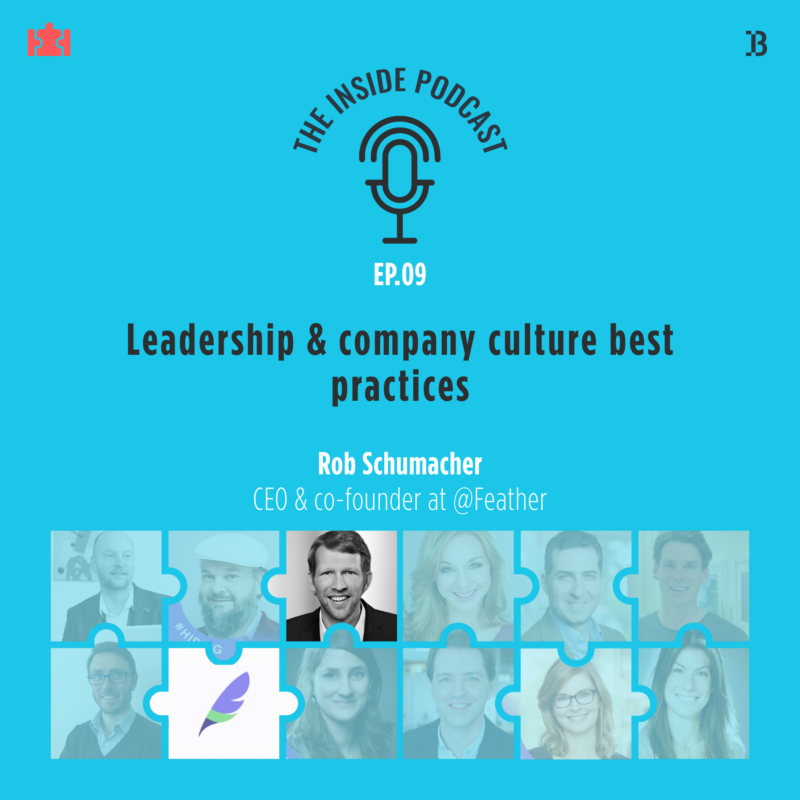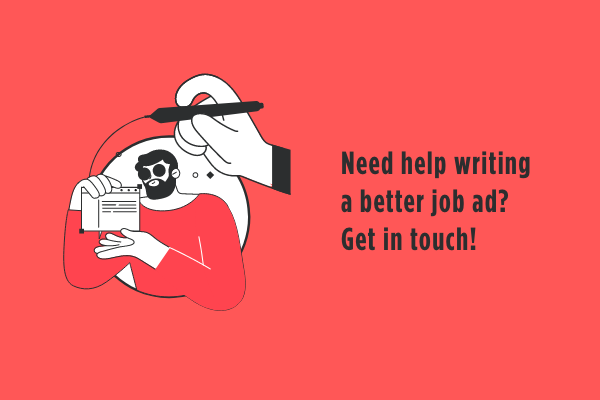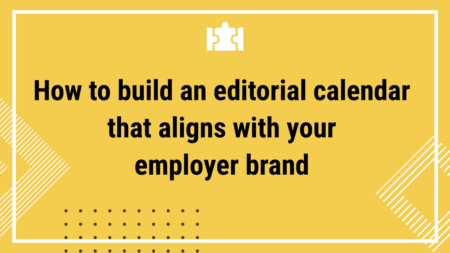Overview
It’s #ThursdayPodcast once again! In episode 9 of Employer Branding: The Inside Podcast we had the pleasure of speaking with Rob Schumacher, CEO & co-founder at Feather. Rob shared with us several eye opening best practices on leadership and company culture. We talked more in-depth about the importance of being results-driven when using data, but also about building a support network to help strengthen your organizational culture. Tune in on Spotify to learn more!
What you’ll learn by listening
- Leadership & company culture best practices
- Guidelines on preserving company culture
- Employer branding trends: diversity in 2022
- The importance of being results-driven when using data
- Social channels suitable for building a strong employer brand
- Building a support network: why it matters & how it can help strengthen your organizational culture
About the company
In the German insurance market, bureaucracy can seem unending and information can be scarce. The aim of Feather is to relieve the burden of researching and purchasing insurance policies and give people what they need: honest, simple insurance.
Feather was founded in 2018 by Rob Schumacher (CEO) and Vincent Audoire (CTO). Vincent was one of the first employees at N26, where he was instrumental in building and scaling their iOS app. Rob was previously working at McKinsey, where he consulted for top insurance companies to help them improve their digital strategy.
It quickly became clear to both of them that the insurance landscape in Germany was opaque and full of paperwork in an increasingly transparent, digital world. So they joined forces to change it.
Podcast link – Enjoy listening to S03Ep.09 of Employer Branding: The Inside Podcast!
Podcast transcription
Georgiana: Hi everyone! This is Georgiana with Employer Branding: The Inside Podcast. It’s been quite a while since our last episode, and today I’m super happy to be welcoming Rob Schumacher from feather. Welcome, Rob! So nice to meet you.
Rob Schumacher: Hi, Georgiana! Yeah, thanks for inviting us along and I’m really happy to be here.
Georgiana: And I would like to first of all, let me introduce Rob. He’s the CEO and the co-founder of Feather, an insurance company based in Berlin, in the sense that you guys provide various types of insurance to expats. Am I correct? But anyway, please detail exactly what the company does.
Rob Schumacher: Absolutely correct. And if there’s any confusion, it probably comes from the fact that we, of course, change over time. And we’ve started offering all types of insurance that an expat could possibly need when coming to Germany. And he started with one or two types of insurance, but now we actually have the full package. All insurance you ever need, really easily with us digitally and in English?
Georgiana: And how long have you guys been around?
Rob Schumacher: We’ve been around, it’s quite scary, since 2018. So well before Corona. And yeah, it’s always scary to look back and realize how long it’s been that we’ve been doing this.
Georgiana: It has been indeed, and I think what you guys are offering is very, very useful in this very intricate landscape of German laws and in German insurance. So congratulations for that. And also, congratulations on growing the company. And basically, this is what we will be touching during our episode today: leadership best practices and company culture best practices.
And, you know, usually one of the things that I discuss during this podcast is how the culture of a company, especially when the company is rather small, is very much synonymous with the persona of the founder. And you are one of the two co-founders, does this stand for Feather? Well, what’s your take on that?
Rob Schumacher: Yeah, so I think it’s an interesting observation. I’m sure it’s true. The thing is, my co-founder, Vincent and myself, were extremely different in a lot of ways. And there’s only a couple. So a lot of topics were even on completely opposite ends of a spectrum. But there are some places where we agree. And I think it’s actually the things that we agree on that brought us together in the first place. And there’s also the, you know, the shared values that we build the company on. So yeah, I think that’s exactly how it is for us.
Georgiana: And I believe, I don’t know for sure, because I only lead very small companies in my life, when it comes to scaling from two to 10 to 40. What does one leader need to do in order to preserve the company culture and the company values? Isn’t that very difficult?
Rob Schumacher: Um, well, we’re not at 40 yet. But we did notice, as you say, I mean, with two people, you don’t really have to do anything to keep company, you just like the person and you kind of agree with them on some level. And that will actually be the same for the first couple of people joining the company as well, I don’t think you really have to actively worry about company culture or values.
Because when you’re a very small team, it’s just always a very natural fit. You probably haven’t had that point. And we hadn’t written down what we even meant, or what were the things that we knew were important just because everyone automatically knew. And I think the first time when it starts becoming important is maybe when you’re 15, or 20, people where you are starting to hire, you know, everything goes a little bit quicker and more things happen in parallel.
So you don’t have enough time to kind of slowly onboard people and kind of really take your time with the hiring process in person, because someone else will be doing the hiring as well. So that’s the first time when you have to know what kind of company culture? And then you know, how do we find out if people have the kind of fit that we want?
Georgiana: So if you were to sum up some best practices that leadership needs to take into account to preserve the existing company culture, what would those be?
Rob Schumacher: The two things important if you want to preserve your culture, the first one is understanding what your culture is. And round about 20 people is when it gets a little bit harder. So actually writing down what the culture is, is step one. And then step two, when you understand what it is that you know that your company culture is finding out ways of testing people to see if they’re going to be a cultural fit.
So obviously, those two things need to happen in order and you’re going to have to do it at some point because you won’t be the one doing all the interviews yourself anymore. You’re going to have to kind of trust other people to make the judgment on whether or not it will be a good cultural fit for you as a company.
Georgiana: And one thing we also are discussing now in the beginning of the year, it’s still the first quarter. So I think we can also tackle this, our trends in employer branding. And one of the most important trends that I’ve heard and seen seems to be diversity this year, how does your company look at diversity?
Rob Schumacher: Definitely a really big topic. And I think, in fact, I’ll say we have the three worst things going for us in terms of diversity. So first of all, we are a tech company. And it’s a topic that every tech company has to struggle with to attract diverse talent.
The second thing is an insurance company, which is also you know, insurance is still very, very heavily male held a male dominated industry. And the third thing I’d say that we also struggle with, it’s, we’re a company, you know, this one, we mitigate already, but we’re a German company. And I think German companies are also some of the least diverse companies possible. If you look at C levels in any big German company, it doesn’t get any less diverse than that.
Georgiana: Strong, unfortunately.
Rob Schumacher: Absolutely. And so, you know, but yeah, we’re fully aware that it’s pretty terrible, so we do a couple of things. So first of all, we fully believe that diverse teams build better results, I think, you have to believe that as a company, otherwise, you’ll just do diversity, as you know, it’s a little bit like doing ESG is another trend, you know, you can put you can pretend to me ESG. But if you don’t believe it, you’re not actually going to change how you are. And I think diversity is another thing that you have to actually do some actions that prove that you care about it, and not just say that you care about it.
So yeah, so I think we, so starting with where we are, it’s a terrible space that we’re in, in a lot of ways. And I think diversity usually goes beyond. So you can start with a really obvious one, which is gender. But in tech, age is another really big problem as well. And there’s many other forms of diversity that you just don’t even realize exist.
And so what we’re doing is, I think, creating an awareness as usual, it’s step one is understanding that by, for example, how you phrase a particular job posting, that you’re actually stopping people from applying for a job, despite them being qualified, just because you write the word ninja. So right ninja in a blog post, you know, it’s women who are less likely to apply. So it’s, it’s really about you, you can do a lot already, just by leveling the playing field for everyone that’s applying at your company, and then actively, then even just saying something like, we actively, you know, encourage anyone, you know, from underrepresented groups in tech to apply.
And I think that goes a long way. And in fact, we notice in interviews as well, so in interviews, some sometimes people with a, like a non typical tech background will say, you know, because you wrote that in, in the job post, you know, that that’s the thing that got me to apply, which is really cool to kind of get the feedback and see that it’s working. Yeah, but despite everything that I said, I think it’s still a long way to go for all the three industries that we’re kind of in at the same time. And, yep, something we’re really working on. And we’re trying to actually work on the problems and not say that we’re working on the problems.
Georgiana: But that’s, in my opinion. I’ve seen this interest in diversity only recently. And I know several people who are advocates for various groups of people in Berlin and in Germany. And I’m hoping to get some of them on this podcast to discuss some of the issues you’ve mentioned, because really, some of them are very, very visible, and intangible. And I faced one of them myself recently, when I was told by someone that in some areas, 36 years old would be considered too old for some roles.
Rob Schumacher: I think the radio, so my wife is also pretty unsafe, more successful than me in her career, which I’ll always have like an eye opening. When I see what she has to go through and all of the things you just don’t see them yourself. So it’s even just awareness of the problem. I think there’s just not even enough awareness for the problem. So if you’re speaking about a solution to a problem, you can’t really speak about the solution until you’ve understood the problem. And jumping to saying we’re doing diverse diversity things doesn’t really mean anything until kind of the whole company understands it. And then yeah, So, for example, your podcast, educating people around the problems that are already really helpful because you can’t you can’t tackle something if you don’t actually understand the problem, you know?
Georgiana: Exactly. I’m really curious. Rob, you have a PhD in mathematics. Does this make you as a CEO more data driven?
Rob Schumacher: So I think it’s fair to say I use very, very little of, of the PhD in mathematics in my actual job. And actually, funnily enough, linking it back to diversity. We don’t actually even require degrees to work at Feather. So I think it’s a, it’s a little bit of an outdated, you know, actually, having worked for a while is way more valuable, or like having done a project that you care about is way more valuable than the degree that you have. So I’ll say, the PhD doesn’t help. But I think the kind of person that I am, I’m definitely, I like understanding numbers. And I like understanding how pieces fit together.
Yeah, no, I am sure, yeah. I’m also fully aware that I understand numbers, but I have to kind of get the numbers in the company. So there’s actually a pretty cool course that I’m doing called SQL habit, which is allowing me to, you know, run data queries myself in the company. So we make all data in the company transparent to anyone. So we like to not hide data from anyone, anyone from anywhere in the company can kind of see how the numbers are going per insurance type, how many people are signing up every day, how many people are canceling, it’s all really transparent. And it’s actually quite a fun playground to go into and play around with numbers. So I kind of see it as my continued learning journey in data and numbers. And I think I’m not the only one at the company that does that.
Georgiana: Exactly. However, the reason I asked is that most companies try to implement various Employer Branding policies, or you know, employee happiness or employee engagement policies, but they never really measure the results. They never know what’s happening after implementing several policies, or after using certain tools. And I’m always wondering, I’ve asked this question before, does data play a role in what we guys are doing? What are you guys in your company doing at the moment? Because I think sometimes some things are just left hanging. You know,
Rob Schumacher: That’s amazing. So I love that question. I didn’t, in fact, I’ll tell you the question that we always ask, if someone suggests anything, we always ask, How do we know if it’s been successful? You know, so it’s like, how do we know in three months and six months? And then 12 months? If what we’re, you know, what are we trying to achieve? And how do we know if we’ve achieved that? And it’s okay to sometimes be a bit vague, if there are things that, you know, sometimes some things are vague, and that’s okay.
But you should always try and make it measurable. Because otherwise, it’s too easy to kid yourself later that what you’ve, you know, to do stuff without having any impact or to kid yourself that it’s actually worked. So it’s a, I think that that’s actually an even bigger question than being data driven, is more like, I guess, being results driven in using data. Data to back it up? Yeah. So I think that’s a really great question.
Georgiana: How involved are you as the CEO and getting to know your people understanding their needs and their wants?
Rob Schumacher: So this one’s a tough one to answer, because it’s changed a lot over time. So we are a remote company, and we’re growing fast. So that wasn’t always the case. So I think we started out, we were not, so some people will always be remote. But we spent a lot of time in an office together. And it was just very easy to catch up with everyone in the company, you know, when you’re less than 10 people, you don’t really have to put any system in place to make sure that everyone is being heard.
And now we’ve got the two things being fully remote and growing, which does make it a lot harder. And in fact, I think it’s too big of a task for me to manage on my own. So at first, I would have thought, no problem. I’ll just have some check ins with everyone throughout the company, but it doesn’t work. So there needs to be more of a system.
So we do actually have a people person who’s like the key part of the role is making, you know, making us work as a remote growing company. And yeah, a lot of that is actually having a place for people to voice concerns. Even so I think it’s, you know, people have to be able to be heard and we have to be held accountable as well. So, exactly, as I said before, like How do we know it’s been successful? She actually checks in with Vincent and myself, that’s my co founder, we see if there are issues, we have to follow back up with her what we’re doing to address the issue. So there’s, so people can really see us, we take it seriously, and someone is holding us accountable as well.
Georgiana: Okay, nice. And which social channel would you say is the most suitable for, for building a strong employer brand? According to what your colleague tells you, it’s not one personal experience.
Rob Schumacher: So it actually really depends on which employees you’re kind of going after. So it’s, it’s almost, you know, if you’re, if you’re targeting customers, considering an employee, as a customer, you’d kind of want to do the branding in the place where the customer is. So for some employees, that will be LinkedIn. For other employees, there’ll be other channels.
But one of the coolest or kind of the two coolest channels that we found, the first one is actually your website. So everyone checks out your website. And, again, we noticed this in interviews, when we update the about page to include more information about us or explain how we do things, people really check it out. And it’s something that I was really surprised by so I, you know, we did it. And there was an update, and every other interview, suddenly, people were mentioning, I saw you wrote this and that, you know, you you Oh, so that’s how you work as a company.
Georgiana: And the more happy you mentioned, this, so happy that reinforces everything that I’ve been talking about recently.
Rob Schumacher: Yeah, I mean, it was a coincidence that we got that feedback. So we just had a page that was two years old, we knew we needed to refresh it, and then we thought we’d do it properly. And it really made a difference. And then the other one that’s really cool is having, for example, things exactly like this podcast, where you can kind of interact with other people, because it definitely gives you a bigger reach than otherwise. So otherwise, you know, you’re kind of I mean, not say spamming, but you know, you’re hitting the same people if you’re always within your circle, so it’s really nice to collaborate with other people and speak about things, topics such as this. So I think those would be my top two, in fact. Yeah.
Georgiana: I think it’s also about, in the end, getting out of your comfort zone. And yes, like you said, interacting with people from other areas. So yeah, absolutely. But having a good about you page or a good career page, and really describing and, and saying how you work and what types of people you want to work with, and what types of people you don’t want to work with. That’s also very bold, and very helpful recently, so congratulations for that. It takes courage, you know, to be transparent about who you are, and what you do.
Rob Schumacher: You have to accept that it won’t be for everyone. I think when you start off, you think, you know, you think whatever you’re doing is for everyone. But it’s almost, I think there’s so many people, that’s never going to be the case. And you and you actually deliver better stuff if you do a bit more tailored, and it’s not for everyone. And it’s yeah, as you say, it’s exactly the same for employer branding, not not everyone has to be happy with the way you do things.
In fact, one more anecdote here that we have started asking in job interviews. So we say, you know, some people do like a very structured job and being told exactly what to do. And you know, they feel at ease when it’s very clear exactly what they have to do. And then they know they’re done. And other people like a little bit more ambiguity or kind of don’t want to be told exactly what to do. They want to be told this is where we want to go, but you have full freedom to figure out how to get there.
We try in our interviews to figure out, we definitely want the latter type, you know, where they’re not exactly told what to do. I think there’s so many positives for your company culture, if you don’t tell people what to do, but rather, you know, what the goal is, and they figure it out themselves, so we try and find that out in interviews as well. And I think there’s a lot of little things like, it’s definitely not for everyone, and you have to be happy that it’s not for everyone.
Georgiana: Yeah, people have actually written books on the topic and they coined the phrase repel the many and attract the few so Exactly. What do you expect from this year professionally? And what does Feather expect?
Rob Schumacher: Um, I’ll start with Feather. So we’re actually expanding into a couple of European countries this year, so that’s going to be really exciting and challenging at the same time. And there’s going. The team likely is going to double. And, yeah, a lot of growth. So not just in terms of numbers, but also in terms of complexity. I’m both excited and a little bit scared for that one. And, of course, so my role in the company is always gonna, I mean, already, it does change every six months, or 12 months. And I’m, personally, quite excited to see how my role changes as we grow as a company.
And that’s, I’m not exactly sure what to expect, because every time I kind of got comfortable in a roll, it was already kind of time to transition into the next one. So you only have a pretty short phase where you feel in control of things, and everything’s great. And then you know, Okay, it’s time to look for the next thing. And I can already feel the next thing kicking off right now. And you never kind of know until you figured it out. So you’re always in, there’s a couple of months of figuring out how my mode of working with the company works, you figure it out, it kind of goes really well. And then you, unfortunately, lose the good mode. And you’re in a little bit of a searching mode again. So I’m, I’m also excited for this year, and as always excited and a little bit scared, just because, you know, change is always scary for everyone.
Georgiana: It’s always growing, I guess. Yeah. Totally true. And Rob, just to sum this up, I’d like to ask you to mention one resource that’s been useful for you. It’s something that I ask all of my guests, because I’m sure we have a lot to learn from, from everybody. What has helped you along the way, a blog, a podcast a book, the course,
Rob Schumacher: I have to say. So two answers here. The first one is actually the most helpful thing is the network of people that you can build around you. So a support network. And that can be I’m going to say, upwards, sideways and downwards. So upwards, people that are further along, in whatever you want to do, grab them and see if you can check in with them every noun sideways. So that’s people doing the same kind of job as you catching up with them. And below you as well.
Helping people grow in their role helps you understand how other people are helping you grow in your role as well. So I think you should always be looking kind of upward, sideways and downwards. But to me, yeah, to make it more specific, something that I found really helpful and changed my life a lot is the Seven Habits of Highly Effective People. I’m sure you know it.
Georgiana: I haven’t tried it. It’s been on my list for a while. But yeah, I’m curious to know your view on it.
Rob Schumacher: Yeah, so it’s a bit of a slow read. So I think it’s not that you read it and be done with it. I think I read it over at least over a year, or maybe one and a half years. And trying to see. So a lot of I think there’s a kind of concept that makes you a good person and effective person. And somehow they always go together. And if there’s loads of different ways of describing the same concept. And this is just kind of one view of those concepts. And there’s many other books that describe the same thing. But this is the one I kind of work through to try and make some of those concepts my own as well. I view it more as a working book. I read a couple of pages, see if I’m actually changing how I am and then going on.
Georgiana: Okay, great. Well, this was really really nice. Thank you so much for talking to me today. I wish you all the best if you’d like to tell people how they can reach you or Feather via other channels and LinkedIn, now is the moment.
Rob Schumacher: Yeah, you can find us easiest is Google us for you know Feather Insurance and you’ll find us and I also really enjoyed today just because every time you get asked interesting questions, you know helps your thinking as well. You know about how you’re thinking about things. So it was really fun for me as well. Thanks a lot.
Georgiana: I’m glad to hear that. Good luck, Rob and talk to you soon.
This was Employer Branding: The Inside Podcast. You can find our podcasts on Spotify on Apple podcasts and content on employer branding-related things on employerbranding.tech. Until the next time, stay tuned.







